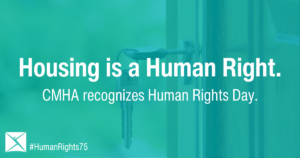Equality, justice, freedom, human dignity – these are the foundational rights enshrined by the Universal Declaration of Human Rights, which celebrates its 75th anniversary on December 10. As the international community comes together to recognize this milestone, CMHA North Bay and District is reflecting on how access to housing, a key human rights issue, is affecting communities across Ontario.
Adequate housing is recognized as part of the right to an adequate standard of living in the Declaration. The Canadian government explicitly recognized the right to housing in 2019 with the National Housing Strategy Act, clearly setting forth housing as one of the country’s policy priorities. Yet over 500,000 people in Canada who are living with a mental illness are inadequately housed – and of those individuals approximately 120,000 are homeless. In Ontario alone, more than 16,000 people are homeless on any given night, and between 40 and 60 per cent of those people are experiencing chronic homelessness.
This is particularly concerning for individuals with mental health and addictions issues, as the evidence shows housing can help a person’s journey to recovery from even a severe mental health issue. In partnership with other stakeholders, CMHA continues its efforts to promote the need for housing in general and provide housing with supports for people with lived experience of mental illness and addictions.
To combat chronic homelessness and to help people with mental illness or substance use issues thrive in the community, serious and sustained investment is required in supportive housing models across Ontario. Research shows that investing in housing with these supports can contribute to significant cost savings for the health system: it costs $486 a day to keep a person in a hospital, compared to $72 per day to house a person in the community with supports.
To learn more about this issue, read Housing First: The Path to Recovery.
Read more about Human Rights Day on the event website.

